Eaar Chanvixay, a midwife from a remote district hospital in northeastern Lao PDR, is part of a new wave of health professionals capacitated by UNFPA- delivered knowledge to combat misinformation and educate remote communities about family planning services.
The 28-year-old, who operates out of Nonghaed hospital in Xiangkhuang province, is one of 12 midwives from geographically remote provinces like Houaphanh, Xiangkhuang and Oudomxay with diverse ethnic groups and limited health services, that has received family planning service training from UNFPA and the Ministry of Health in 2021.
“I have learned about all methods of contraception and I feel more confident to deliver family planning services for women and girls,” she said of the training, rolled out with financial support from Korea Foundation for International Healthcare (KOFIH).
She has been working as a midwife since 2017, but with limited practical experience. Initially she was not confident to give advice to people who come for the service on contraceptives because she did not have much experience in advising methods for women. “Each time I needed to do it, I had to seek support from my trained colleagues,” said Ms Eaar. It was challenging for her because when patients ask about side effects and other details related to the method they are interested in, she was not able to explain.
She said a key part of the training is giving grassroots health workers the knowledge to combat misconceptions.
“I recommend my patients use implants as a long-term contraception method, but then I have to explain to women and girls that it is a good method and doesn’t cause harm,” explained Ms Eaar.
She said many women were often scared of implants as the word in Lao language, “Fang Khem”, literally means “putting needles inside the arm”. The training allows Eaar and other health professionals to counter fears that “the needles would move from the arm and harm their inner organs, such as lung or heart” and clearly explain how implants work.
Ms Eaar revealed that an inability to deliver quality messages on family planning to women and couples meant many patients did not seek support, which results in unplanned pregnancies and other sexual and reproductive health issues.
“This training provided me not just knowledge about methods of contraception but confidence in delivery of information. I know techniques on how to provide consultations to different people based on their needs. How to guide some to shift from only using short term methods such as condoms or pills, because, for these methods they need to travel often to buy or obtain them at the health facility”. Said Ms Eaar.
Under KOFIH support, in person and online capacity building activities were delivered for in-service staff, targeting faculty members and clinical midwives in Xiengkhouang and Houaphanh. The training covered the topics of Family planning and Basic Emergency Obstetric Care (BEmOC). Of all health facilities in the two provinces, 40% have had at least one midwife trained.
Ms. Mariam A. Khan, UNFPA Representative said: “According to the State of the World Midwifery (SoWMY) Report 2021, a well educated midwife can perform about 90% of essential SRMNCAH. Yet, globally and in Laos, we are still facing a shortage of midwives. Therefore, we must invest in midwives by increasing the number of trained and deployed midwives to provide quality health services to mothers and babies across the country, because Midwives Save Lives! .”
Ms Eaar shared: “Recently, there was one patient who came to complain to me that her period stopped after having an implant. She was scared it would be harmful to her body and she wanted to remove it. Before the training, I would struggle to give the right explanation and convince the patient to keep the implant as I wasn’t aware of the side effects very well. But this time, I was calm and confident to explain that an implant is a medicine which affects hormones and it impacts our bodies in different ways: some women may not be affected at all and some would experience period inconsistency. The patient understood and agreed to retain the implant. As a midwife, this is a success in helping a women plan if and when to become pregnant”.
Strengthening midwifery practice through training and capacity building is one of the key interventions that the Government of Lao PDR is fostering to achieve the national maternal health targets as well as ICPD25 commitments. UNFPA mobilizes technical expertise and financial support including through partners such as: KOFIH, Luxembourg and MHTF to help Laos reach the target of one midwife per each health facility by 2030. Since the training started, Ms Eaar, skilled and confident about her midwifery practice, says that "the health facility monthly client numbers for contraceptive consultations have increased at least 3-5 times in 2022"
***
UNFPA, the U.N.'s sexual and reproductive health agency, works in over 150 countries, including Lao PDR, to achieve zero maternal deaths, zero unmet family planning needs and zero gender-based violence.
For more information, please contact:


